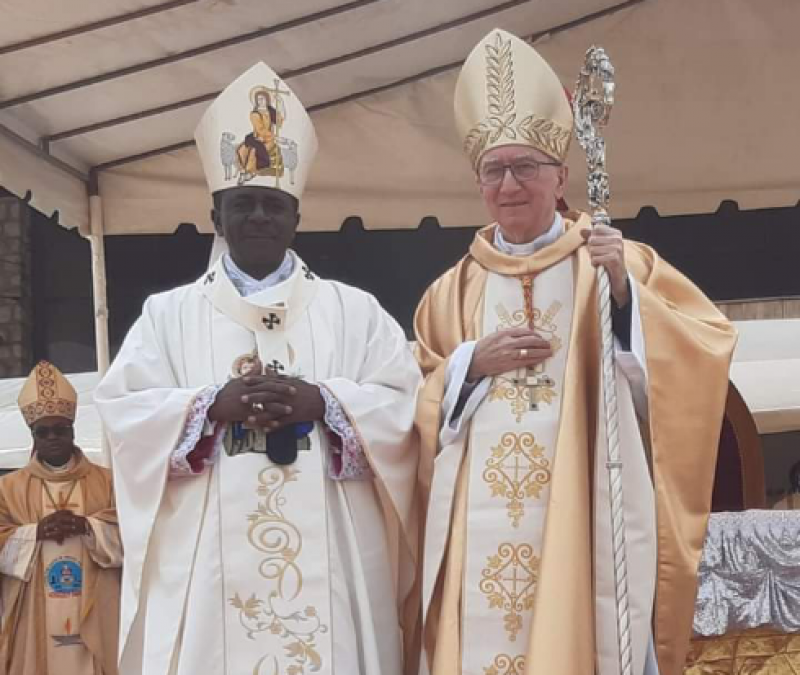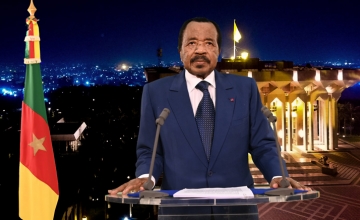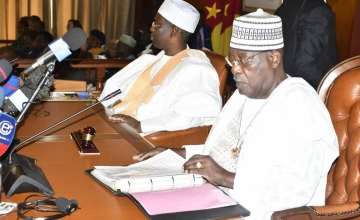
The Pope's envoy prayed for peace and called on the separatist fighters to lay down their weapons and give peace a chance, for development cannot take place in an atmosphere of war.
The mass for the imposition of the pallium on Archbishop Nkea was held under tight security. Despite boycott and lockdown calls from Amba fighters, thousands of Catholic Christians attended the ceremony.
The Vatican Secretary of State encouraged Christians to be steadfast and remain prayerful in the midst of crisis.
He assured Christians that the Vatican is aware of the pains they are going through.
Below is the entirety of Cardinal Parolin’s sermon transcribed by Cameroon-Info.Net.
Cardinal Pietro Parolin’s sermon
Dear brothers in the episcopate and the presbyterate, distinguished authorities, dear brothers and sisters in the Lord.
I am happy to be celebrating this Eucharistic liturgy with you today. I bring to all of you the greetings of His Holiness Pope Francis and I greet you personally too. The Holy Father carries you in his heart and assures you of his closeness and his prayers.
The Pope is well aware of the difficulties which you have experienced in recent years and are still experiencing. He asked the Lord to console you and in a particular way those who have been victims of violence or who have lost friends and loved ones in this crisis. The Holy Father unites himself to the desire for peace and reconciliation that rises up to God from this precious land.
With you, I give thanks to the Lord who granted us the joy of encountering one another today. On this occasion of the imposition of the pallium on His Excellency Archbishop Andrew Nkea, Pastor of this particular church in which the one, holy, catholic and apostolic church of Christ is truly present and active.
The presence of so many people attests to your affection for your archbishop and to your desire to celebrate with him.
The pallium is a symbol of a particular bond of communion with the pope. Woven with the wools of lambs, blessed by the Pope on the feast of St. Agnes, it evokes the figures of the good shepherd who goes in search of the lost sheep and places it on his shoulders. It represents the power that the archbishop exercises in the ecclesiastical province in communion with the supreme pontiff. It is a sign filled with meaning, which powerfully inaugurates the mandate of every new archbishop from the outset his new ministry is placed under the sign of communion, obedience to and in union with the Holy Father, and in sharing with his brothers, bishops.
At the same time, in the proclamation of the gospel of mark, we heard today of another beginning. The beginning of the public ministry of Jesus. It is the first scene in what is commonly called ‘the day ay Capernaum’. A type of day marked by the indelible traces of Jesus’ actions. In the synagogue on the Sabbath Day, the first act of the Lord’s public ministry brings to light two striking characteristics. His quality as a teacher and his battling of unclean spirits. The gospel writer tells us that Jesus’ first action is to teach. Jesus presents himself above all as a teacher, a teacher endowed with an authority that leaves his listeners amazed. He has an authoritativeness surpassing that of the scribes of the day. Jesus’s authority is not based on his rhetorical ability. But overflows from his mystery, his being the son of God as revealed in the scene of the baptism in the Jordan which as just preceded today’s reading. As he is the son, the beloved, he can teach with authority. Even more, his authority acquires the flavor of something new, a freshness that always accompanies the revelation of his persona as in the famous expression ‘ Jesus Christ brought all newness by bringing himself’.
Presented with this first characteristic, we can ask how available we are to listen to Jesus, the perfect teacher. Even as many voices reverberate and rattle around us, as many behave like teachers in our lives, today’s gospel urges us to give unique importance to the word of Christ. Do we succeed in perceiving his authority? Do we place our trust in him? And as a result, do we trust his word? Have we experienced the freshness of the gospel which is capable of renewing our lives deep down in a radical way? It goes without saying that only constant familiarity with the gospel will allow us to respond to these questions. Only attentiveness to the liturgy and personal reading of scripture will help us discern the word as he passes by. For this reason, the Pope on various occasions has invited us to carry with us a little book of the gospel, pocket gospel. It is not a slogan but a spiritual program.
Let us come now to the second characteristic of Jesus’ personality as it emerges. The battle with the spirit of evil. Standing before Jesus is a man with an unclean spirit. In the presence of Jesus, the unclean spirits appear in the gospel as powers that are not human, who react in a personal way, who possess special knowledge, who contrast with God, dominate, and cause evil to no small number of humans. They are in opposition to the holy spirit of God. Dragging people this way or that way, stop them from being free. And they show themselves to be powerful enemies of human beings. But Jesus is superior to them. With a single word, He conquers their power. He frees men and women from that kind of slavery, restoring to them their integral freedom. Jesus wants the good of men and women and so he frees them from evil. He came for this reason. To cast into perdition the fearsome one who divides man’s inner self. Jesus is able to achieve total liberation precisely through his simple and powerful words, ‘Come out from him!’ No magical formulas. It is his word that is surpassingly effective. And yet, in our text, we note an atmosphere of real struggle. Evil, thus, gets conquered but it is hard to conquer. The second characteristic then of the public life of Jesus sends us back to the theme against evil. In particular, the theme of the spiritual struggle that each of us equally experiences. Evil is there and Christ is able to defeat it. It is up to us to train ourselves every day for this battle.
As expressed in his letter to the Ephesians, the urgent pleas of Apostle Paul come to our aide. ‘be strong in the Lord and in the strength of his might. Put on the whole amour of the Lord so that you may be able to stand against the wilds of the devil. For we are not contending against flesh and blood, but against the principalities, against the power, against the rulers of this present darkness, against the spiritual hosts of wickedness in the heavenly places.
The apostle Paul indicates to us the origin of our strength. The Lord works in us with the energy of his power. He urges us together to unmask the enemy that is the spirit of evil. Paul’s exhortation allows the second characteristic of the excerpt from Mark’s gospel to resound. We can synthesize his exhortation with two terms that are key for the spiritual journey. The first is serenity and the second vigilance. Serenity and vigilance. Serenity because in Christ, we are conquerors. By clinging to him through prayers and sacramental life, vigilance is required to be able to discern evil where it has taken root beginning with our hearts.
Dear brothers and sisters. In the difficult situation in which you find yourselves living, you are experiencing actions close to the power of evil that are in the world. Unfortunately, there is much news of violence, division, and struggles that affect this beloved land.
Today’s gospel teaches us not to fear evil and to trust in him who knows how to conquer evil. It teaches us too that the way to defeat evil passes before us through our inner reality, through the purifying of each person’s heart. Whether struggles against the evil that is lodged in our hearts becomes a bearer of good, and peace in the family, among the friends in the community. And he or she becomes in this way receiver of hope for the
“Lay down your weapons”
We are all responsible for peace. All the actors of society are responsible, from the smallest to the biggest person. No one can feel exonerated from the struggle against evil. This is the challenge that faces you today. That finally, arms may be put down, and peace and reconciliation may reign within us and around us. Violence never solves problems. It only creates more problems. Peace is a journey of hope, dialogue, and reconciliation. Dialogue, therefore, is the best way to solve conflicts and misunderstandings.
After having shed light on the main teachings of this episode, I wish to conclude by drawing attention to the reaction of all who heard Jesus's words. The evangelist Mark notes that everyone was amazed and the question arose: what is this? 2000 years later, the amazement in the question with regards to the Lord Jesus has important attitudes to be guarded with care. We should never stop reflecting on this mystery in order to avoid the risk of spiritual pride, the risk of being someone who is convinced that they already know everything about Jesus without realizing that he is always greater than what we can humanly grasp. We should never stop marveling at the fundamental mystery of our Christian faith. The mystery of the son of God who became man for our salvation and our liberation. In this joyful celebration, let us ask for the grace to let ourselves be transformed by the encounter with Jesus.
May the Lord grant us ever to have confidence in his word, to hope in his liberating strength to mark the love with which he sustains us. May he always be close to each one of you, represented in your heart by his peace. And from there, may the marvelous gift of peace shine forth in every corner of this beloved land and upon every person why lives here. I entrust your communities and each of you to Mary, mother of the church and queen of peace upon you. And I hope the protection of St. Joseph to whom your cathedral here is dedicated with the words of the Holy Father Pope Francis. Oh blessed Joseph, show yourself to be a father for us too and guide us along the way of life. Obtain for us grace, mercy, and courage and defend us from every evil. Amen!
Blessing the faithful
Again, congratulations to Archbishop Andrew for receiving the pallium. We continue to pray for him and for his ministry in this archdiocese.
I will bring to the Holy Father your greetings. But especially your witness, faith, hope, and love. Let us grow together in faith, hope, and love in the search for peace. We have prayed Our Lady Queen Of Peace to give peace to this land, to give peace to this region. And we have made it with a lot of faith, with great faith because faith is our strength. And if we believe, we will get what we are asking from God through Mary our mother. Now, as we receive the blessings, let us remain always united in prayers.











